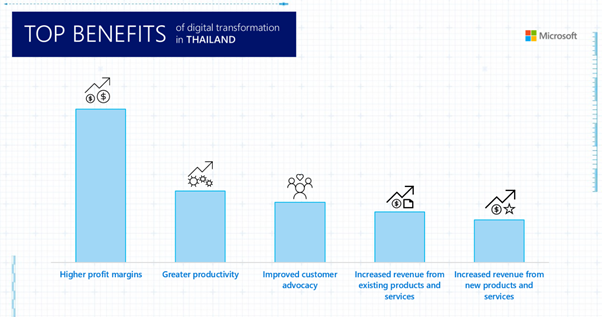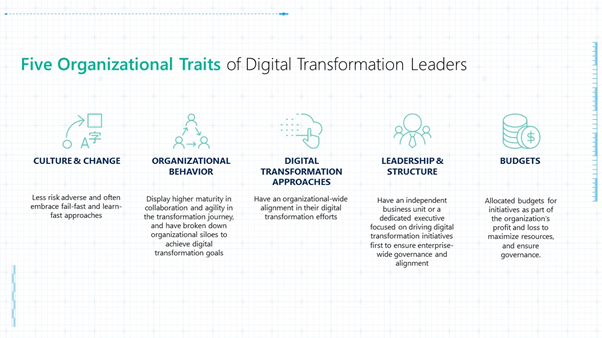- IDC study commissioned by Microsoft predicts that approximately 40% of Thailand’s GDP will be derived from digital products or services by 2021
- By 2021, digital transformation is expected to add 0.4% CAGR GDP growth annually
- Digital transformation has increased profit margin, productivity, customer advocacy, and revenue from existing as well as new products & services. These benefits will also improve by at least 40% in three years.
- Leaders in digital transformation reap double the benefits compared to Followers.
- Digital transformation in Thailand will benefit citizens with an increment of personal income through freelance and digital work as well as creation of higher value jobs.
Bangkok, February 20, 2018 – By 2021, digital transformation will add an estimated US$9 billion (approximately 282 billion baht) to Thailand’s GDP, and increase the growth rate by 0.4% annually, according to a new business study released today. The research, “Unlocking the Economic Impact of Digital Transformation in Asia Pacific”, was produced by Microsoft in partnership with IDC Asia/Pacific.
The study predicts a dramatic acceleration in the pace of digital transformation across Asia Pacific economies. In 2017, about 4% of Thailand’s GDP was derived from digital products and services created directly through the use of digital technologies, such as mobility, cloud, Internet of Things (IoT), and artificial intelligence (AI).
“Thailand is clearly on the digital transformation fast track. Within the next four years, we expect to see approximately 40% of Thailand’s GDP to be derived from digital products and services,” said Dhanawat Suthumpun, Managing Director, Microsoft (Thailand) Limited. “At the same time, organizations in Asia Pacific are increasingly deploying emerging technologies such as artificial intelligence as part of their digital transformation initiatives, and that will accelerate growth even further.”
The survey conducted with 1,560 business decision makers in mid and large-sized organizations across 15 economies in the region highlights the rapid impact and widespread disruption that digital transformation is having on traditional business models.
The study, which included 100 respondents from Thailand, identified five key benefits to their bottom line from digital transformation:
According to the research findings, business leaders expect to see more than 40% improvements in those key areas by 2020, with the biggest jump expected in increased revenue from new products and services.
Digital Leaders in Asia Pacific to Gain Lion’s Share of Economic Opportunities
The study indicates that while 82% of organizations in Thailand are in the midst of their digital transformation journey, only 7% in the entire region can be classified as Leaders. These are organizations that have full or progressing digital transformation strategies, with at least a third of their revenue derived from digital products and services. In addition, these companies are seeing between 20 – 30% improvements in benefits across various business areas from their initiatives.
The study indicates that Leaders experience double the benefits of Followers, and these improvements will be more pronounced by 2020. Almost half of Leaders have a full digital transformation strategy in place.
“The pace of digital transformation is accelerating, and IDC expects that by 2021, at least 48% of Southeast Asia’s GDP will be derived from digital products and services, with growth in every industry driven by digitally enhanced offerings, operations and relationships. The study shows Leaders seeing double the benefits of Followers, with improvements in productivity, cost reductions, and customer advocacy. To remain competitive, organizations must establish new metrics, realign organization structures, and re-architect their technology platform,” said Michael Araneta, Associate Vice President for IDC Financial Insights.
The Study identified key differences between Leaders and Followers in Asia Pacific, which contribute to the improvements tracked:
- Leaders are more concerned about competitors and emergence of disruptive technologies: The digital economy has also given rise to new types of competitors, as well as emerging technologies such as AI that have contributed to the disruption of business models.
- Business agility and culture of innovation are key goals: When addressing business concerns, Leaders are focused on creating a culture of agility and innovation to counter competition. Followers, on the other hand, are more focused on improving employee productivity and profitability.
- Measuring digital transformation successes: Organizations across Asia Pacific are starting to adopt new key performance indicators (KPI) to better measure their digital transformation initiatives, such as effectiveness of processes, data as a capital, and customer advocacy in the form of Net Promoter Score (NPS). As organizations realize the potential of data as the new oil for the digital economy, Leaders are much more focused on leveraging data to grow revenue and productivity, and to transform business models.
- Leaders are more aware of challenges in their digital transformation journeys: In addition to skills and cybersecurity threats as key challenges, Leaders have also identified the need to bolster their data capabilities through the use of advanced analytics to develop actionable insights in fast-moving markets.
- Leaders are looking to invest in AI and Internet of Things: Emerging technologies such as AI (including cognitive services and robotics) and IoT are areas where Leaders are investing in for 2018. Besides these emerging technologies, Leaders are also more interested in investing in big data analytics to mine data for actionable insights than others.
What sets Leaders apart from others are their ability to ride on the digital transformation wave from an organizational culture perspective. The study found that Leaders have these traits:
“There is a pressing need for organizations to adopt a leaders’ mindset to fully build their digital ecosystem—from employees, to customers, to partners—in order to grow their value chain,” said Alberto Granados, Vice President of Sales, Marketing and Services Group, Microsoft Asia Pacific. “In this regard, Microsoft is uniquely positioned to help organizations across Asia Pacific succeed in their digital transformation journey. We say this with confidence because we, as an organization, have also undergone digital transformation, and we understand what it takes to make these digital initiatives successful.”
Digital Transformation in Asia Pacific Will Ultimately Benefit Citizens
According to the business leaders surveyed, digital transformation will bring about these top three benefits to society:
- Potential increment to personal income through freelance and digital work
- Creation of more higher value jobs
- Smarter, safer and more efficient cities
Respondents in Thailand felt that 95% of jobs will be transformed in the next three years due to digital transformation, and 65% of the jobs in the market today will be redeployed to higher value roles, or reskilled to meet the needs of the digital age.
“The rise of digital transformation in Asia Pacific’s economies will affect the labour market where many types of jobs will evolve and change. What is encouraging is that 79% of respondents are confident that their young professionals already have future ready skills that will help them to transition to new roles,” said Dhanawat.
Riding the Wave of Digital Transformation
Organizations in Asia Pacific need to accelerate their digital transformation journey to reap the full benefits of their initiatives, and to address the invisible revolution brought about the mass adoption of AI. More importantly, companies need to focus on capitalizing their own data in order to gain new market insights, create new digital products and services, and monetize data through data sharing securely, and in collaboration with its ecosystem.
Pariya Chulkaratana, Vice President, E-Commerce and Ancillary Marketing for Thai Airways International Plc (THAI), said, “THAI is embracing digital technology in our organization, not just to drive the business forward but to transform it for the future. In order for us to continue meeting the needs of our customers, we have to understand them as deeply as possible because we believe they are at the heart of everything we do.”
THAI recently upgraded its customer service experience with the launch of “Fah” – an AI-powered chatbot capable of responding to customer inquiries in either Thai or English. Developed using Microsoft Bot Framework and Azure Bot Service, Fah is available 24/7 to provide instantaneous replies to questions on promotional offers, advance check-ins, flight schedule, official merchandise, and travel extras.
The airline is also developing a more dynamic, personalized online presence that utilizes customer data to optimize the experience for each individual visitor, while a native mobile application with a more comprehensive range of features is in the works.
“In this era of cloud transformation, we are empowering our employees to use data analytics to discover deeper customer insights so that our services and offerings can be more customised according to the needs of our customers. We want people across our organization to be capable of creating micro-revolutions that combine to resonate with our customers on a wider level,” Pariya added.
Microsoft recommends organizations to adopt the following strategies to become a digital transformation leader:
- Create a digital culture: An organization need to build a culture of collaboration where it is connected across business functions, and has a vibrant and mature ecosystem of customers and partners. Data can then be embraced across organization and functions, where better decisions can be made and ultimately serving the needs of customers and partners better.
- Build an information ecosystem: In a digital world, organizations are capture more volumes of data internally and externally. The key to becoming a Leader is for organizations to be able to convert data into capital assets, and enable data sharing and collaboration internally and externally in an open yet trusted manner. In addition, a proper data strategy will allow businesses to start their AI initiatives to identify connections, insights and trends.
- Embrace micro-revolutions: In most cases, digital transformation efforts do not start with widespread change, but a series of micro-revolutions. These are small, quick projects that deliver positive business outcomes and accrue to a bigger and bolder digital transformation initiatives.
- Develop Future Ready Skills for Individuals and Organizations: Organizations today must relook at training and reskilling its workforce so that workers are equipped with future ready skill sets such as complex problem solving, critical thinking and creativity for the digital economy. More importantly, they need to rebalance the workforce to attain and attract key digital talents, as well as be open in creating a flexible work source model where they tap into skills-based marketplace. From a digital skills perspective, LinkedIn’s latest study outlines the ABCs of digital talents required for future economies in the region – artificial intelligence, big data and cloud computing.
For more information on Microsoft’s digital transformation solutions for mid and large-sized organizations, visit https://enterprise.microsoft.com/en-apac/.




